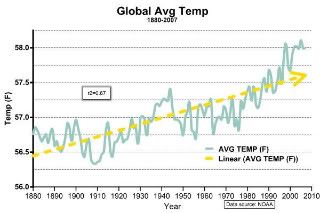Climate skeptics lash out at Hansen -- and the truth about our warming planet
Not surprisingly, the same outfits that have helped corporate greenhouse gas polluters spread disinformation about the science of climate change are none too pleased with NASA scientist Jim Hansen's call to try fossil fuel CEOs for crimes against humanity.
We received a comment about our earlier post today on Hansen's congressional testimony from someone calling themselves "climatestrategies." Though the Blogger profile is not public, we're guessing from the name that these are probably the folks behind Climate Strategies Watch, a project of the fossil fuel-funded climate change deniers at North Carolina's John Locke Foundation and the Heartland Institute of Chicago. The commenter wrote:
Disinformation? It would be nice if Hansen divulged what disinformation he is alleging. Maybe he means the information that global mean surface temperature has not risen for the last 10 years. Or that the oceans have not been shown to be warming. Or that Antarctic ice mass, overall, has increased. Or that despite a claimed consensus, more than 31,000 scientists have signed a petition disputing the belief that global warming will lead to planetary disaster.
But then again, that wouldn't be disinformation -- they would be inconvenient truths for people like Hansen.
We didn't publish that comment, as we have a policy against allowing our comment section to be used to spread disinformation. And this particular comment makes claims that are misleading at best:
* MISLEADING CLAIM #1: Global mean surface temperature has not risen for the last 10 years. In fact, the U.S. government itself has acknowledged a steady climb in global average temperatures beginning in 1880, when reliable record-keeping began, to the present, as we can see in the following chart based on National Oceanic and Atmospheric Administration data (click on image for larger version)

*MISLEADING CLAIM #2: The oceans have not been shown to be warming. In fact, the Intergovernmental Panel on Climate Change (IPCC) released a report last year that among other things documents a warming trend in global ocean temperature measurements. It found that global mean sea surface temperature increased 0.9°F in the 20th century, and stated that "global ocean heat content has increased significantly since the late 1950s."
* MISLEADING CLAIM #3: Thickening ice in Antarctica casts doubt on the reality of global warming. It's true that scientists have documented a thickening of the Antarctic ice, which may temporarily ease sea level rise caused by warming. But at the same time, there's been a dramatic increase in temperatures over Antarctica -- which scientists say is due in large part to greenhouse gas emissions.
* MISLEADING CLAIM #4: More than 31,000 scientists have signed a petition disputing global warming. The commenter is referring to what's known as the Oregon Petition urging the U.S. government against signing the Kyoto protocol. There are questions about the claim that this petition been signed by 31,000 scientists, since its signatories include Drs. Frank Burns, B. J. Honeycutt, and Benjamin Pierce from the TV show M*A*S*H as well as Geraldine Halliwell of the pop group The Spice Girls. Furthermore, it has more signatories with general engineering degrees than degrees in atmosphere, earth and environmental sciences combined -- and only 40 climatologists. Meanwhile, most major climate science organizations agree that climate change is happening and that humans are contributing to it.
Given the increased media attention to climate change that will probably result from Hansen's congressional testimony today, we can expect the deniers and dis-informers to come out in force. An excellent starting point for understanding the truth of climate change is the Union of Concerned Scientists' website on global warming science. UCS also offers a helpful guide to the skeptics, which includes a link to their excellent report titled Smoke, Mirrors & Hot Air: How ExxonMobil Uses Big Tobacco's Tactics to "Manufacture Uncertainty" on Climate Change.
Tags
Sue Sturgis
Sue is the former editorial director of Facing South and the Institute for Southern Studies.
